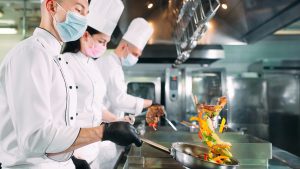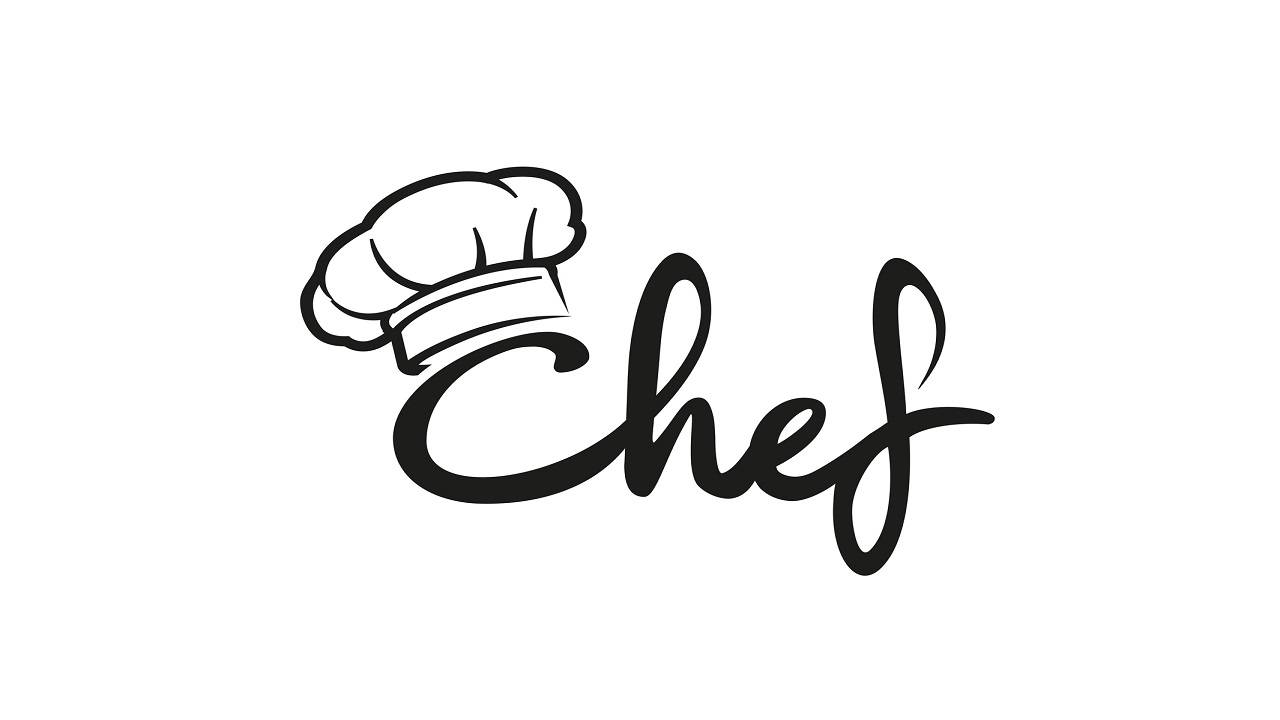Become a chef, an expert in the field of cooking, responsible for preparing and cooking food, organising the kitchen, and creating menus. Chefs oversee all aspects of the cooking process and may work in restaurants, hotels, catering companies, or private households.

What are the Main Types of Chefs?
Executive chefs lead kitchen operations and manage menus, ensuring high culinary standards. Sous chefs support them by coordinating food preparation and managing kitchen staff. Pastry chefs specialise in desserts, working closely with executive chefs. Line chefs oversee specific kitchen stations, ensuring consistent dish preparation.
Executive Chefs
Executive chefs are top-level chefs who lead kitchen operations in restaurants, hotels, or catering businesses. They manage everything from planning menus to supervising staff and ensuring food quality and standards are maintained.
Role and Key Responsibilities:
Executive chefs oversee all kitchen operations, including menu planning, hiring, food safety training, and budgeting. They manage and ensure the smooth running of culinary activities within their establishment.
Sous Chefs
Sous chefs are kitchen professionals who support executive chefs in managing culinary operations. They oversee the preparation and presentation of dishes, supervise kitchen staff, and ensure timely order fulfilment, playing a key role in maintaining kitchen efficiency and food quality.
Role and Key Responsibilities:
Sous chefs assist executive chefs in overseeing kitchen operations. They coordinate the preparation and presentation of dishes, manage kitchen staff, and ensure orders are completed efficiently.
Pastry Chefs
Pastry chefs are professionals specialised in creating desserts, confectionery, and baked goods. They excel in crafting a wide array of sweet treats and collaborate closely with executive chefs to design desserts that enhance the overall menu offerings.
Role and Key Responsibilities:
Pastry chefs are skilled in creating desserts, confectionery, and baked goods. They craft a variety of sweet treats and work closely with the executive chef to design desserts that complement the overall menu.
Line Chefs
Line chefs, also known as station chefs, manage specific kitchen stations like the grill or sauté. They prepare and cook dishes according to the restaurant’s recipes, ensuring consistency and quality.
Role and Key Responsibilities:
A line chef (or station chef) is responsible for a specific station in the kitchen, such as the grill, sauté, or pantry. They prepare and cook dishes according to the restaurant’s menu and standard recipes.
What does a Chef do?

Chefs create new menus with fresh recipes and cooking styles, staying up-to-date with food trends to improve dining experiences. They manage kitchen operations, making sure food quality, cleanliness, and teamwork are top-notch. Chefs also train and schedule kitchen staff, aiming for high standards in both food preparation and service.
Planning and Creating Menus
A chef takes on the responsibility of meticulously planning recipes and consistently aiming to elevate a restaurant’s menu. This involves refining dishes to reflect their unique culinary style, vision, and concept. Through creativity and expertise, chefs innovate and enhance the dining experience, ensuring each dish aligns with their standards of taste, presentation, and overall dining ambiance.
Managing Kitchen Staff and Operations
They oversee kitchen staff, encompassing hiring, training, and scheduling, ensuring smooth and efficient kitchen operations.
Overseeing Food Preparation and Presentation
Chefs oversee the creation, preparation, and presentation of dishes, focusing on balancing flavours, textures, and culinary techniques to ensure high-quality dining experiences. They innovate recipes and maintain standards to continually enhance the menu and meet customer expectations for both taste and visual appeal.
Ensuring Kitchen Hygiene and Safety
Chefs make a concerted effort to ensure kitchens adhere to hygiene and safety regulations, covering food storage, sanitation practices, and all aspects related to health.
Ordering and Managing Inventory
The chef oversees kitchen supplies by ordering necessary items and monitoring inventory levels to prevent shortages, ensuring efficient kitchen operations.
Experimenting with New Recipes and Techniques
Chefs frequently innovate the menu to maintain culinary excitement. They experiment with new recipes and techniques, stay updated on culinary trends, and propose fresh ideas to enhance dining experiences.
Average Salary Range of a Chef
The salary range for chefs varies significantly based on their experience, location, and the type of establishment they work in. Entry-level chefs earn less compared to mid-level and executive chefs, who command higher salaries. Additionally, chefs working in fine dining or luxury restaurants typically earn more than those in casual dining or catering services. Geographic location also plays a significant role, with urban areas generally offering higher wages compared to rural or remote locations.
Salary Ranges Based on Experience and Location
Salaries vary based on experience, location, and the type of establishment. Entry-level chefs typically earn between £20,000 and £30,000 per year in the UK and $30,000 to $45,000 annually in the US. Mid-level chefs can expect to earn around £30,000 to £50,000 per year in the UK, and $45,000 to $70,000 in the US. Executive chefs, or those at the higher end of the market, command salaries ranging from £50,000 to £80,000 or more per year in the UK, and $70,000 to $100,000 or more in the US.
Comparison of Salaries in Different Regions and Types of Restaurants
Salaries will also vary by location, with chefs in urban areas and regions needing culinary services likely earning more than those in rural or remote locations. The type of establishment where a chef works can also influence pay, as those in fine dining or luxury restaurants tend to earn more than those in casual dining or catering services.
Factors Influencing Chef Salaries
Several factors can influence chef salaries:
- Experience: Generally, chefs with more work experience earn higher salaries due to their advanced skills and increased responsibilities.
- Education and Certifications: Enhancing earning potential can be achieved by pursuing further education and obtaining professional certifications.
- Industry: The type of establishment, such as fine dining or catering, can significantly impact salary levels.
Essential Skills of a Chef
To become a successful Chef, you need to bring together technical and soft skills.

Technical Skills
- Latest Techniques and Food Preparation: Chefs should continually practice diverse culinary techniques and food preparation methods necessary to create high-quality meals.
- Knife Skills: Proficiency in knife skills is essential for efficient and precise food preparation.
- Understanding of Food Safety and Hygiene: Knowledge of food safety and hygiene is crucial for maintaining a contamination-free kitchen environment.
Soft Skills
- Creativity: Being creative is crucial for developing new recipes and innovative dishes that delight customers.
- Leadership: Strong leadership skills are necessary for managing kitchen staff and ensuring efficient kitchen operations.
- Food Preparation: Confidence in creating quick and nutritious lunches for everyone.
- Time Management: Effective time management skills are vital for chefs to complete tasks promptly and ensure timely serving of dishes amidst multiple responsibilities.
- Attention to Detail: Precision and attention to detail are essential for achieving high-quality dishes and impeccable presentation.
Career Development Tips for Chef
- Staying Updated with Culinary Trends and Techniques: Regularly try to stay updated with the latest culinary trends and techniques.
- Networking Through Professional Organisations and Culinary Events: Engaging with professional organisations and participating in culinary events is crucial for building networks and accessing valuable resources.
- Gaining Experience Through Internships and Entry-Level Positions: Progressing through internships and starting in entry-level roles is essential to gain experience and develop skills in the workplace.
- Perfecting Culinary and Management Skills: Chefs can enhance their culinary and management skills through consistent practice, learning from mistakes, and repeating successful techniques to advance their careers.
Qualifications and Requirements for Chef
To become a Chef specific educational and professional requirements must be met.
Educational Requirements
- Educational Experience: Formal education through culinary school or a culinary apprenticeship programme is highly valuable for learning essential skills, techniques, and concepts.
- Relevant Coursework in Culinary Arts and Food Safety: Participation in relevant coursework, such as culinary arts, nutrition, and food safety, provides essential skills and knowledge.
Certification Requirements (If Applicable)
- Food Safety Certifications: Obtaining certifications in food safety demonstrates competence and dedication to professional standards.
- First Aid Training: Completing first aid training is also important to ensure readiness in handling emergencies effectively.
Experience Requirements
- Internships, Apprenticeships, and Entry-Level Positions: Practical skills and a solid reputation are crucial in the kitchen, acquired through hands-on experiences like internships, apprenticeships, and entry-level roles.
- Hands-On Training: Direct experience in various kitchen environments provides valuable insights and skills necessary for career advancement in culinary arts.
How to Become a Chef?
Becoming a chef involves formal culinary education, gaining practical experience through internships and entry-level kitchen roles, and obtaining certifications like food safety and professional chef credentials. Continuing education through workshops and culinary competitions and joining culinary associations are essential for ongoing professional development.
Completing Relevant Education
- Graduating from Culinary School or Apprenticeship Programmes: This achievement is a fundamental requirement.
- Attending Programmes and Training: Specialised courses and training in culinary arts offer a comprehensive education tailored to meet the demands of various roles in hotel kitchens.
Gaining Practical Experience
- Internships, Apprenticeships, and Entry-Level Jobs: Gain hands-on experience in a professional kitchen through internships, apprenticeships, and entry-level positions.
- Workplace Exposure: Exposure to diverse kitchen environments and operations helps in developing adaptable skills and understanding different culinary styles.
Obtaining Certification
- Food Safety Certifications: Obtain food safety certifications to demonstrate expertise and dedication to professional standards.
- Professional Chef Certifications (Certified Executive Chef): Achieving a professional chef certification, like Certified Executive Chef, distinguishes chefs and enhances their credentials.
Continuing Professional Development
- Workshops, Seminars, and Cuisine Competitions: Engage in ongoing professional development through workshops, seminars, and culinary competitions.
- Advanced Training and Specialisations: Pursue advanced training and specialisations to enhance your culinary skills and expertise.
Networking
- Join Professional Culinary Associations: Become a member of trade organisations like the American Culinary Federation (ACF) or the World Association of Chefs’ Societies (WACS) to network with peers and stay updated on industry trends.
- Attend Culinary Events and Conferences: Develop professional relationships and gain insights from industry leaders by participating in culinary events and conferences.
Get Qualified as a Chef
Professional Chef Certificate, Become a Professional Chef, Professional Chef Essentials Online Course
Frequently Asked Questions (FAQ)
- Why should you be a Chef?
A career as a chef can be an exciting and creative challenge. Choosing this exhilarating career allows you to unleash your creativity with food, work in diverse kitchen environments, and craft fabulous meals for diners. The position offers security, good pay, and numerous opportunities for career development and promotion. As a chef, you can often find personal satisfaction in creating visually and tastefully exciting dishes that delight your patrons.
- Is Becoming a Chef a Good Career Choice for You?
If you love to cook, have an eye for detail, and pride yourself on your dedication and hard work, then your cooking hobby might translate into a stellar career as a chef. Becoming a chef can be perfect if you thrive in a fast-paced, busy setting, have an aptitude for working with your hands, and relish the sight and aroma of food cooking to perfection. It is especially well-suited for individuals who learn best through repeated effort, are motivated by internal rewards, and enjoy experimenting with new recipes and techniques. With perseverance, this career path offers fulfilment and ample opportunities for advancement.
- How much does a Chef Earn?
Chef salaries vary significantly based on factors such as experience, location (whether urban or rural), and the type of establishment. Entry-level chefs in the UK typically earn between £20,000 and £30,000 annually, while mid-level chefs can expect to earn £30,000 to £50,000. Executive or high-end chefs command higher salaries ranging from £50,000 to £80,000 or more. In the US, corresponding salaries are $30,000 to $45,000 for entry-level, $45,000 to $70,000 for mid-level, and $70,000 to $100,000 or more for executive chefs. Exchange rates influence these figures, with £1 approximately equal to $1.47.
- Which Qualifications Can Help with a Career as a Chef?
Studying in a culinary school or completing a training program is crucial for mastering the foundational skills of the profession. These provide opportunities to participate in professional courses and training programs to further specialise and hone culinary expertise. Obtaining current food safety certifications and professional chef credentials, such as the Certified Executive Chef designation, helps meet industry standards. Internships and entry-level positions also offer valuable hands-on experience, facilitating entry and growth within the culinary industry.
- Do I Need to Be Experienced to Get Started?
Not at all. Many chefs begin with a simple desire to learn. Even skilled cooks often start with formal education, either in culinary school or through apprenticeship programmes. Additionally, most chefs gain experience through several internships or entry-level positions before securing their first formal jobs. Enthusiasm, a willingness to learn, and an interest in cooking are essential starting points.
- Chef Career Outlook
These factors create a promising career path for aspiring chefs. The restaurant industry, luxury hotels, cafes, and other entertainment outlets are constantly seeking talented culinary experts. Therefore, there is little risk of unemployment in such a continually expanding industry. Moreover, master chefs have the potential to earn a good salary, enjoy job security, and benefit from numerous opportunities for advancement within these sectors.
- Chef Hierarchy and Progressing Within the Role
Normally, chefs begin their careers by taking entry-level jobs as line cooks or commis chefs. They eventually progress to roles such as executive chef, pastry chef, sous chef, and other mid-level positions. Advancement in this industry often hinges on formal or on-the-job training, as well as acquiring various certifications and licenses.
- Chef Exit Options and Opportunities
Chefs can also explore numerous alternative career paths and opportunities outside the kitchen. With skills that transfer easily, chefs can consider careers in culinary education, food writing, consulting, and entrepreneurship. Experienced and skilled chefs can transition horizontally into roles such as instructors, critics, or restaurant owners. They can pursue higher qualifications and work as educators or consultants in the culinary field.


